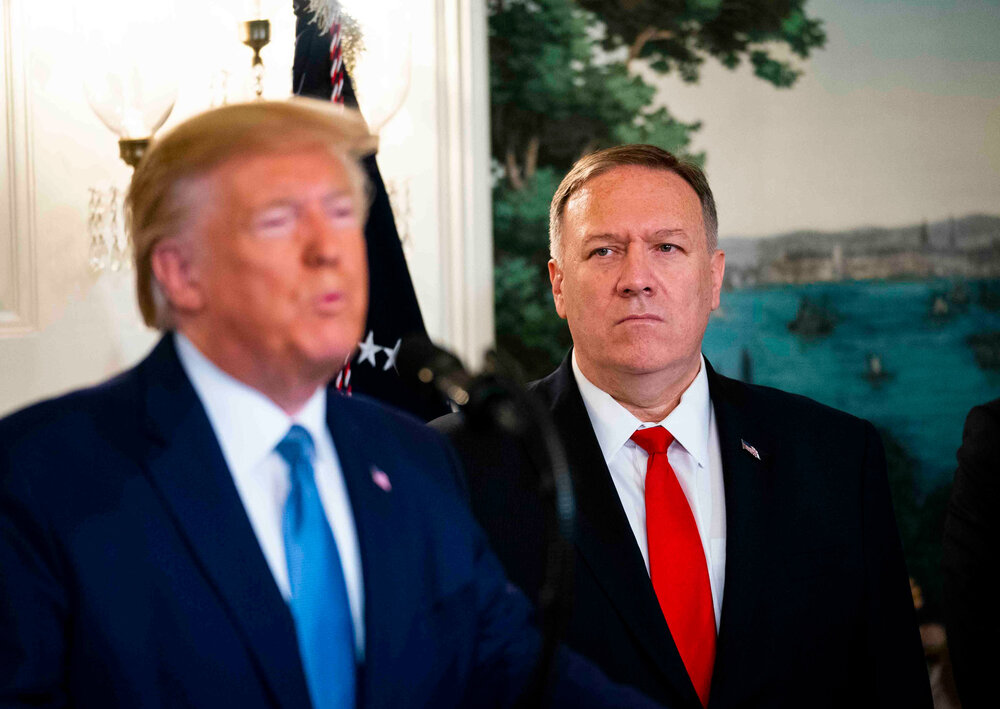Eternal fear: How do U.S. officials involved in General Soleimani assassination deal with their fear

Many former U.S. officials involved in the assassination of former Islamic Revolution Guards Corps Qods Force Commander Lieutenant General Qassem Soleimani have been gripped by deep fear.
From 1998 to 2020, General Soleimani was the commander of the Quds Force, an IRGC elite division primarily responsible for overseas operations. On January 2, 2020, then-U.S. President Donald Trump made a decision to order his assassination. Consequently, the U.S. targeted the commander by a drone at midnight on January 2, 2020, in Baghdad.
Reacting to the assassination of the legendary commander, the Iranian Foreign Ministry spokesman said, “A true example of a terrorist attack and state terrorism, which was committed in an organized way by the U.S. government.”
Iranian military officials have vowed to hunt down the perpetrators of the assassination.
Only six days after the strike, U.S. Congress in a joint resolution (S.J.Res.68) stated that “members of the United States Armed Forces and intelligence community, and all those involved in the planning of January 2, 2020, strike on Qassem Soleimani, including President Donald J. Trump, should be commended for their efforts in a successful mission.”
The Congressional report clearly states all those involved in the assassination, yet why are some trying to distance themselves from the action!?
Mark Esper, then-U.S. defense secretary, in his new memoir titled “A Sacred Oath: Memoirs of a Defense Secretary in Extraordinary Times” has emphasized that General Soleimani’s assassination was “a really bad idea with very big consequences.” Trump's defense chief said that he was accused of disloyalty after he refused to back claims made by Trump. Throughout the book, Esper has presented himself as one who stoutly resisted Trump’s decisions.
Moreover, Esper said that this decision “stunned” the chairman of the Joint Chiefs of Staff Mark Milley, indicating that Milley too opposed the idea.
In addition to the aforementioned, Jared Kushner, the senior advisor to Trump, in his to-be-published memoir “Breaking History: A White House Memoir” about the order of General Soleimani’s Assassination has denied any knowledge of the assassination order. The Tehran Times has learned that Trump’s son-in-law has tried to distance himself from the decision, saying in a chapter that he “was totally unaware of what was about to come.”
Pompeo and Hook’s protection and fears
Recently, in a recent report titled “Sensitive but Unclassified,” the U.S. State Department announced that it has spent $13.1 million between August 2021 and February 2022 on protecting former Secretary of State Mike Pompeo and former Iran envoy Brian Hook. The two men have reportedly been receiving 24-hour security, according to The Hill1.
In a press briefing on January 10, 2020, Hook, answering a question on whether he believed that Iran has actually concluded its retaliation for the assassination, said, “I don’t have the words in front of me. But it would seem that Iran has concluded its response in retaliation for the killing of Qassem Soleimani.” 2
Hossein Mousavian, a Middle East security and nuclear policy specialist at Princeton University, during an Iranian documentary named “72 Hours”, said “after returning to the U.S., an American told me that Brian Hook’s wife had not slept for several days and that she was shaking and crying. That’s how afraid they were.”
Additionally, Pompeo, another official involved in the terror strike has lost 41kg (90lb) over six months following his exit from the Trump administration last year. There’s certainly no denying that Pompeo has undergone a kind of physical transformation. But his claims that he has lost weight through minor diet and exercise have created controversy among nutritionists and fitness industry professionals – none of whom believe such dramatic weight loss would be possible, especially for his age, according to The Guardian3.
All these measures and fears and trepidations happened due to a decision made in the U.S. decision-making process. A decision that could have resulted in a national catastrophe. Virtually any military action could escalate into a war, as evidenced by the 1914 assassination of Archduke Franz Ferdinand, which triggered World War I.
1 https://thehill.com/homenews/administration/598038-state-department-pays-2-million-per-month-to-provide-security-to/
2 https://2017-2021.state.gov/press-briefing-with-brian-hook-u-s-special-representative-for-iran-and-senior-policy-advisor-u-s-department-of-state/index.html
3 https://www.theguardian.com/us-news/2022/jan/11/mike-pompeo-weight-loss-diet-exercise-experts
